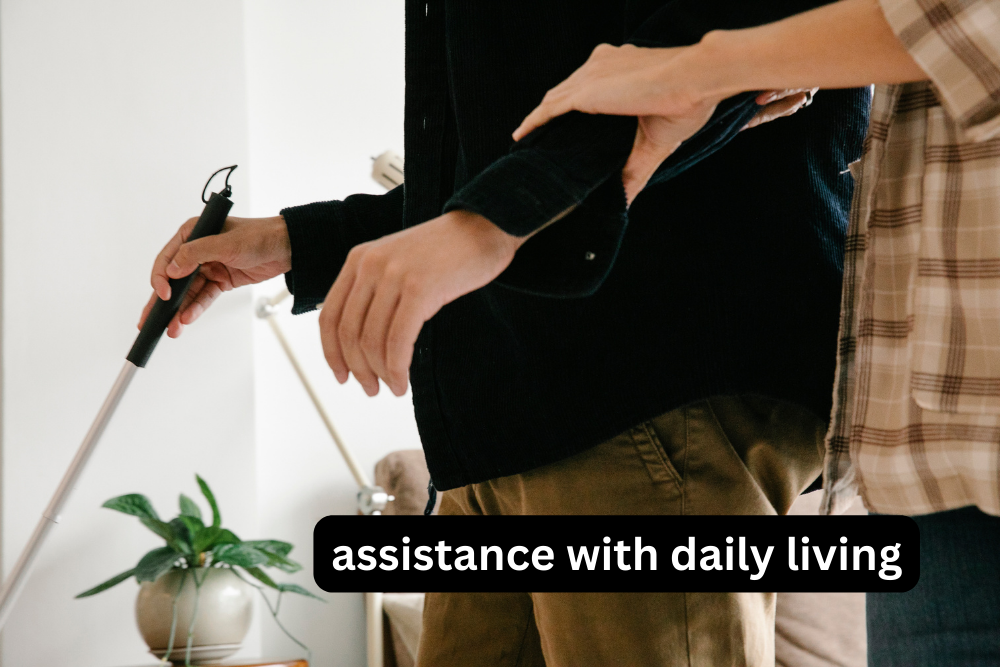
Daily living refers to the routine activities that people perform daily to meet basic needs, such as eating, grooming, personal hygiene, and maintaining a safe living environment. As individuals age, face disabilities, or experience health challenges, daily living can become increasingly difficult. Providing assistance with daily living activities ensures individuals maintain their autonomy, dignity, and overall well-being. This guide outlines various aspects of daily living assistance, including personal care, home maintenance, mobility support, and emotional well-being, offering practical strategies and tips to enhance quality of life.
1. Personal Care Assistance
Personal care includes activities such as bathing, dressing, grooming, and managing hygiene. These tasks are essential for maintaining physical health and self-esteem.
a. Bathing and Hygiene
- Assistance with Bathing: For individuals who struggle with balance or mobility, a shower chair or bathtub grab bars can enhance safety.
- Personal Hygiene Products: Use ergonomic tools like long-handled sponges and grabbers to help reach difficult areas.
- Incontinence Care: Adult diapers, wipes, and bed pads improve comfort and convenience for those with limited mobility.
b. Dressing and Grooming
- Adaptive Clothing: Choose clothes with easy fasteners, such as Velcro, magnetic buttons, or elastic waistbands.
- Grooming Tools: Electric razors and hair clippers are easier for individuals with reduced hand dexterity.
- Coordination Aids: Grabbers, shoehorns, and button hooks simplify tasks like getting dressed.
2. Home Maintenance Support
Maintaining a safe and organized living space contributes to the well-being and comfort of individuals.
a. Safety Modifications
- Mobility Aids: Install ramps, handrails, or stair lifts to facilitate movement.
- Non-slip Flooring: Use anti-slip mats and rugs to reduce the risk of falls.
- Emergency Alarms and Medical Alerts: Ensure that medical alert systems are in place for quick access to help in case of emergencies.
b. Cleaning and Organizing
- Assistive Devices: Grabbers, long-handled mops, and dusters make cleaning easier.
- Decluttering: Simplify spaces to reduce hazards and create an accessible environment.
- Personalized Cleaning Schedules: Develop a manageable routine that prioritizes essential tasks.
3. Mobility Support
Mobility challenges can impact daily living, but various assistive devices can promote independence.
a. Mobility Aids
- Walking Aids: Use canes, walkers, or rollators tailored to the user’s specific needs.
- Wheelchairs: Manual or powered wheelchairs improve movement and accessibility.
- Transportation Assistance: Mobility scooters or accessible vehicles enhance independence outside the home.
b. Physical Therapy and Exercises
- Exercises for Strength and Flexibility: Engage in regular physical therapy to improve mobility and reduce discomfort.
- Occupational Therapy: A professional therapist can design customized strategies to assist with mobility limitations.
4. Nutritional Support and Meal Preparation
Proper nutrition is vital for maintaining energy and health, especially for individuals with limited mobility or dietary restrictions.
a. Meal Planning and Preparation
- Adaptive Cooking Tools: Use utensils with large handles or voice-activated appliances to aid in meal preparation.
- Pre-prepared Meals: Stock easy-to-prepare, nutritious frozen or shelf-stable meals for convenience.
- Hydration: Encourage regular water intake, especially if individuals are prone to dehydration.
b. Specialized Diets
- Dietary Adjustments: Consider dietary restrictions such as low-sodium, low-sugar, or high-fiber needs.
- Nutritional Counseling: Consult with a dietitian to ensure the diet meets nutritional requirements.
5. Emotional Well-being and Social Engagement
Maintaining emotional health is essential for overall well-being, especially during periods of illness or aging.
a. Emotional Support
- Counseling Services: Professional counseling helps individuals cope with stress, anxiety, or depression.
- Support Groups: Joining support groups provides a sense of community and shared experiences.
- Encouraging Self-Care: Engage in hobbies, mindfulness practices, or relaxation techniques to promote mental well-being.
b. Social Interaction
- Connection Tools: Use communication devices like smartphones, tablets, or video calls to stay connected with family and friends.
- Volunteer Opportunities: Encourage participation in local volunteer activities or community events.
- Companionship: Provide regular visits or caregiver support to combat feelings of isolation.
6. Financial and Legal Planning
Financial stability and proper legal planning are crucial aspects of ensuring continued independence.
a. Financial Planning
- Budgeting and Planning: Create a budget that accounts for medical expenses, home modifications, and support services.
- Assistance Programs: Explore government programs or local organizations that provide financial aid for healthcare, home modifications, and long-term care.
b. Legal Considerations
- Power of Attorney and Healthcare Directives: Establish legal documents like power of attorney, healthcare proxies, and wills to ensure wishes are honored.
- Long-Term Care Insurance: Understand options available for coverage in case of extended medical needs.
Conclusion
Assistance with daily living is essential for individuals facing health challenges, aging, or disabilities. By providing support in personal care, home maintenance, mobility, nutrition, emotional well-being, and financial planning, individuals can maintain their independence, dignity, and quality of life. Implementing practical strategies, utilizing assistive devices, and seeking professional support ensures that individuals can continue to live comfortably and confidently within their homes and communities





Leave a Reply